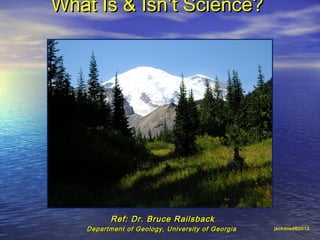
What Is & Isn't Science
- 1. What Is & Isn’t Science? Ref: Dr. Bruce Railsback Department of Geology, University of Georgia jschmied©2012
- 2. What is Science? Science is the concerted human effort to understand, the history of the natural world & how the natural world works. jschmied©2012
- 3. What does Science use as the basis of all scientific understanding? Science uses observable, physical evidence as the basis of all scientific understanding.
- 4. How is Science http://www.physorg.com/news84027776.html Done? a. Science is done through observation of natural phenomena, b. and/or through experimentation … that tries to simulate natural processes under benjaminsternke.typepad.com/.../f_madscience.jpg controlled conditions. jschmied©2012
- 5. 2 Types of Science: Type 1: Observational Science Example 1a An ecologist studying the distribution of Pitcher Plants in a wetland. Example 1b An Ecologist studying the growth rate of Mink in an island ecosystem. jschmied©2012
- 6. Observational Science Example 2 • A geologist examining the fossils in an outcrop. jschmied©2012
- 7. Observational Science Example 3 • An astrophysicist photographing distant galaxies to determine the formation of the Universe. jschmied©2012
- 8. Observational Science Example 4 • A climatologist sifting data from weather balloons on weather patterns. jschmied©2012
- 9. http://www.cdc.gov/niosh/mining/images%5CChemistryLabSRL.jpg 2 Types of Science Type 2: Experimental Science Example 1 A chemist observes the rates of one chemical reaction at a variety of temperatures to see what patterns emerge. http://portal.techhigh.us/Teachers/chapariana/PublishingImages/chemistry%20lab.jpg
- 10. http://www.nytimes.com/2007/05/15/science/15cern.html?fta=y Type 2: Experimental Science Example 2 • A nuclear physicist recording the results of bombarding a particular type of matter with to see what patterns emerge. http://www.nytimes.com/imagepages/2007/05/15/science/15cern_slidetwo.html
- 11. http://www.contractlaboratory.com/www/images/people/scientist_crystal.gif Type 2: Experimental Science Example 3 • A biologist observing the reaction of a particular tissue to various stimulants is experimenting to find patterns too! jschmied©2012 http://www.kidsbiology.com/images/biologist-2.jpg
- 12. http://www.gbrmpa.gov.au/__data/assets/image/0008/17648/biologist.jpg What are all scientists attempting to do? Observing and Experimenting in order to detect patterns in nature. jschmied©2012 http://asunews.asu.edu/files/images/Algae.jpg
- 13. www.puzzlehouse.com/astronomer.htm Two things in common amongst all scientists: 1. Making & recording observations of nature or of simulations of nature, in order to learn more about how nature works. 2. Showing that old ideas are wrong and developing new ideas may better explain nature. jschmied©2012 http://cache.eb.com/eb/image?id=93353&rendTypeId=4
- 14. What Isn’t Science? Science Isn’t Art Art is the attempt to express an individual's feelings or ideas about something in a way that others find beautiful, graceful, or pleasing jschmied©2012
- 15. http://www.punaridge.org/doc/teacher/method/Default.htm What Isn’t Science? Science Isn’t Art Science is the attempt to make public and, repeatable conclusions about the natural world. http://www.punaridge.org/doc/teacher/method/Default.htm jschmied©2012
- 16. What Isn’t Science? Science Isn’t Technology madassgamers.com • Science doesn't make things. Scientists generate knowledge. • Engineers use scientific knowledge to generate technology. iphone5unlock1.com jschmied©2012
- 17. What Isn ’t Science? Science is often confused with Truth and Certainty. It ’s just not so… Science Isn ’t Truth • Most scientists seek Truth; they don't know or generate Truth . Ref: Dr. Bruce Railsback, Department of Geology, University of Georgia jschmied©2012 Sheldon F. Gottlieb, Ph.D. Department of Biological Sciences, University of South Alabama
- 18. What Isn ’t Science? Science Isn ’t Certainty • Scientists use evidence to propose and test theories, knowing that future evidence may change, revise, or even reject today's theories. Ref: Dr. Bruce Railsback, Department of Geology, University of Georgia jschmied©2012 Sheldon F. Gottlieb, Ph.D. Department of Biological Sciences, University of South Alabama
- 19. http://academics.hamilton.edu/asian_studies/home/TempleCulture.html What Isn’t Science? Science Isn’t Religion • Science and belief systems are very different, in what they try to do and in the approaches each use to accomplish their goals. jschmied©2012 Ref: Dr. Bruce Railsback, Department of Geology, University of Georgia www.christchurchstellarton.ca/ Sheldon F. Gottlieb, Ph.D. Department of Biological Sciences, University of South Alabama
- 20. http://commons.wikimedia.org/wiki/Main_Page What Isn’t Science? Science Isn’t Religion Science seeks to explain the origin, nature, and processes of the physically detectable universe. http://blog.baliwww.com/wp-content/photos/palasari_church_1.jpg Science’s underlying assumptions are tested and retested using observable physical evidence. Ref: Dr. Bruce Railsback, Department of Geology, University of Georgia Sheldon F. Gottlieb, Ph.D. Department of Biological Sciences, University of South Alabama
- 21. The Three Basic Questions Science Asks…. http://evolution.berkeley.edu/evosite/nature/I3basicquestions.shtml #1 What’s there: The astronaut picking up rocks on the moon, The nuclear physicist bombarding atoms, The marine biologist describing a newly discovered species, The paleontologist digging in promising strata, are all seeking to find out….. http://starchild.gsfc.nasa.gov/Images/StarChild/sp “What’s there?” ace_level2/aldrin_big.gif jschmied©2012
- 22. The Three Basic Questions Science Asks…. http://evolution.berkeley.edu/evosite/nature/I3basicquestions.shtml #2 - How does it work? A geologist comparing the effects of time on moon rocks to the effects of time on earth rocks, The nuclear physicist observing the behavior of particles, The paleontologist studying the locomotion of an extinct dinosaur, all are asking….. “How does it work?” jschmied©2008
- 23. The Three Basic Questions Science Asks…. http://evolution.berkeley.edu/evosite/nature/I3basicquestions.shtml #3 How did it come to be this way? Each of these scientists tries to reconstruct the histories of their objects of study. Whether these objects are rocks, elementary particles, marine organisms, or fossils, scientists are asking, “How did it come to be this way?” jschmied©2012
- 24. http://klabs.org/richcontent/MAPLDCon02/exhibits/rock1_medium.jpg http://www.csb.yale.edu/userguides/graphics/ribbons/help/dna_rgb.gif http://www.afsc.noaa.gov/nmml/gallery_admin/albums/cetaceans/killer/oo-48_orca.JPG
